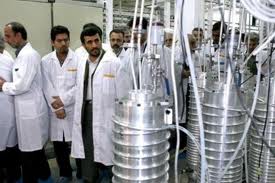 The question is whether the weapon North Korea tested this month was its own, Iran's, or a joint project.
The question is whether the weapon North Korea tested this month was its own, Iran's, or a joint project.During Secretary of State John Kerry's listening tour of the Middle East, one troubling regional issue might go unspoken: the possibility that Iran already has nuclear weapons capability.
That will certainly change when President Obama lands next month in Israel, where the issue is at the top of the agenda. The emergence of an Iranian atomic bomb would represent a U.S. foreign policy failure of historic proportions. It is not the kind of crisis that Kerry would like to face in his first month on the job or that Obama would like to shape his second term.
Fortunately for them both, if Tehran does have the bomb, odds are it will keep it under wraps, at least for the time being.
So far, the case that Iran already has the bomb is largely circumstantial. Shortly after North Korea announced this month that it had successfully carried out its third�underground nuclear test,�Saudi Arabian news media reported�that Mohsen Fakhrizadeh-Mahabadi, a leading Iranian nuclear scientist, was on hand for the blast. This should come as no surprise. Iran and North Korea have long cooperated on nuclear and ballistic missile technologies. Iran's ballistic missiles are based on North Korean designs, and the two countries have long exchanged defense scientists and engineers.
New weapon tested
Perhaps more important, the�RAND Corporation reports�that the third North Korean nuclear test appears to many experts to be fundamentally different from its previous two efforts. North Korea's first tests used plutonium to trigger the nuclear explosion. This one, according to some atmospheric tests, likely used highly enriched uranium, exactly the form of nuclear weapon pursued by Iran.
The question is whether the weapon North Korea tested this month was its own, Iran's or a joint project. A senior U.S. official told�The New York Times,�"It's very possible that the North Koreans are testing for two countries." It would be foolish for Iran to test a nuclear weapon on its own soil. Nuclear weapons cannot be detonated in secret; they leave unique seismic markers that can be traced back to their source. An in-country test would simply confirm the existence of a program that for years�Iran has denied.
It would also be unwise for Iran to immediately announce it had conducted a nuclear test. After all, the North Koreans could have detonated Tehran's only working nuclear weapon. The Islamic Republic would then be in the worst possible position, unmasked as a nuclear proliferator yet lacking a stockpile of weapons to deter U.S. punitive action.
It would be safest to test the weapon in another country, confirm the design works and then quietly produce enough weapons to give America pause.
North Korea's experience is an inspiration to Iran in its defiance of the United Nations and the United States. The rogue regime in Pyongyang faced down the international community to develop and test a nuclear weapon after being told repeatedly that it would "not be allowed" to do so. North Korea achieved this with fewer natural resources than Iran, far less money and facing tougher economic sanctions. And Pyongyang never paid the serious penalty that Western nations threatened.
Keep it quiet
Even when Tehran begins stockpiling weapons, it need not make its nuclear status official.
For example, Israel has long maintained a policy of ambiguity regarding its nuclear weapons, believed to consist of 100-200 warheads. Iran could follow suit, allowing just enough information to leak out to give it some deterrent power but not face the public embarrassment, international condemnation and possible military response for having created the weapons it denied wanting.
Days after North Korea's nuclear test, Iran's supreme leader, Ayatollah Ali Khamenei, reiterated that his country did not want to build atomic weapons, but that if it "intended to possess nuclear weapons, no power could stop us."
This strange construction � saying the Islamic Republic does not desire nuclear weapons but there was no way to prevent it from having them � might have been the first in a series of diplomatic signals intending to inform the United States that, with North Korea's help, the game is already over and Iran has won.
By USA Today
The Iran Project is not responsible for the content of quoted articles.










